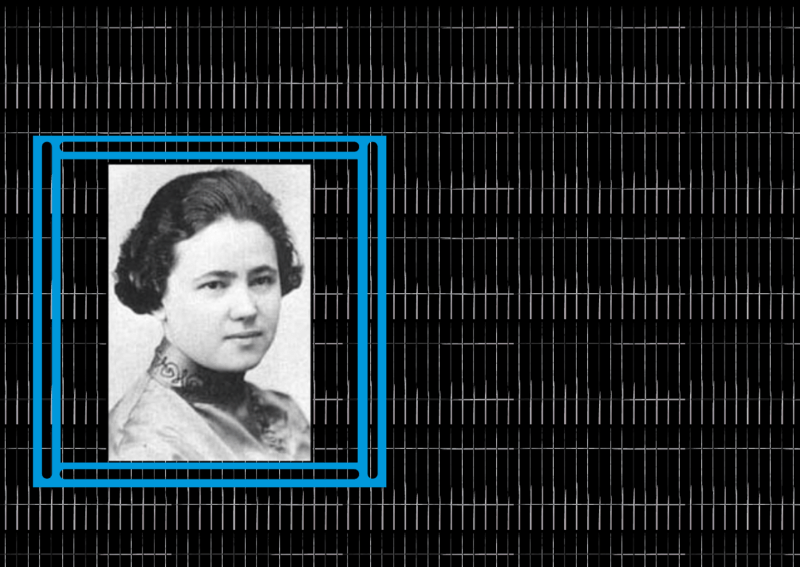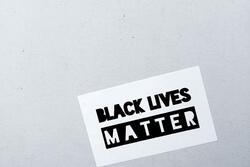Mollie Steimer: Finding a Radical Approach to the American Criminal Justice System
A black background with a white alef encircled at its center—this is the flag of the Jewish anarchists. Jewish Anarchism was once a popular social and political identity held by many European and American Jews including Emma Goldman, Martin Buber, and Noam Chomsky. Another Jewish anarchist (though a lesser-known one) is Mollie Steimer, who dedicated her life to advocating for political prisoners.
After immigrating to New York from the Russian empire with her family at age fifteen, Steimer worked in a garment factory where she was first exposed to radical ideas. She went on to join the Jewish radicalist group Frayhayt (“Liberty”) in 1917, which supported the Russian Revolution and distributed propaganda materials in both English and Yiddish. One leaflet criticized the American government and its intervention in the Russian Revolution, and the government charged the group with conspiring to violate the Sedition Act. Steimer received a fine and a prison sentence of fifteen years.
After posting bail, Steimer would be arrested more than eight times while appealing her sentence. When the Supreme Court upheld the conviction, Frayhayt’s lawyer negotiated a pardon for the arrested members—on the condition of their deportation to Russia and banned re-entry to the United States.
Back in Russia, Steimer met Senay Fleshin, a fellow Jewish anarchist. Together, they spread anarchist propaganda and advocated for Soviet political prisoners. Twice exiled to Siberia, the couple was eventually expelled from the Soviet Union. Steimer continued her work advocating for political prisoners in Berlin and Paris. After escaping Nazi Europe, they fled to Mexico where they lived with other political exiles until their deaths.
Steimer interacted with the American criminal justice system in the late 1910s and early 1920s. During that time period, there were consistently around 111,000 people incarcerated within the American prison system. Now, in 2020, that number has grown approximately 21 times over to a prison population of 2.3 million. 2.3 million is 0.7 percent of the country’s total population, which means that almost one out of every hundred Americans is incarcerated. Black and Hispanic Americans make up 32 percent of the US population, but these groups make up 56 percent of the US incarcerated population. In addition, the majority of people in American jails haven’t even been convicted yet and are awaiting trial behind bars, unable to post bail. On a global scale, America makes up four percent of the world’s population; yet it holds 20 percent of its prisoners. Clearly, the American legal system is unjust, corrupt, racist, and inhumane; it must be reformed. But how?
Incarcerated many times herself, Mollie Steimer advocated for prisoners throughout her life, in dedication to “[her] ideal, anarchist communism.” So, what would an anarcho-communist approach to dealing with the American criminal justice system look like? Anarcho-communists believe in the abolition of government, capitalism, wage labor, and private property. The only way to reform this system, I believe Steimer would argue, is to abolish it.
This may seem like a radical idea, but stick with me for a moment. As our system has been flawed since its inception, it can’t be fixed. But tearing it down would provide the unique opportunity to build something new. And it’s not hypothetical; there is a better option.
Americans visiting many Scandanavian countries wouldn’t even realize that they’re looking at a prison when they are. In places like Denmark, Norway, Sweden, and Finland, prisons are places of rehabilitation instead of punishment. Cells have windows, inmates have the opportunities to pursue education and interact with each other, solitary confinement essentially doesn’t exist, and prisons are located near towns so families can easily visit. Incarcerated people are actually treated like people.
This works. America has one of the highest recidivism rates in the world at around 50 percent depending on the state. Contrarily, countries with systems like these have much lower ratings (36 percent in Rwanda, 27 percent in Denmark, and only 20 percent in Norway).
These systems can be created to replace old, inhumane systems. After the Rwandan genocide, the country committed itself to criminal justice reform by implementing restorative justice tactics in their prisons and enacting progressive programs that include allowing prisoners to work largely unsupervised for appropriate wages. Additionally, officers in these prisons often have counseling training and work one-on-one with inmates on their educational endeavors and financial issues. When formerly-incarcerated people are released from institutions like these, there's a clear road ahead of them and they aren’t returning to lives and relationships that have been destroyed by their time in prison.
The modern American criminal justice reform movement is gaining traction and national attention. Groups like the American Civil Liberties Union (ACLU), the Sentencing Project, the Innocence Project, the Brennan Center for Justice, and the Marshall Project are all tackling the legal and penal systems through an array of different tactics. Sentencing reform is a central focus of the reform movement. This fight includes relaxing sentencing laws and abolishing mandatory minimums—regulations created to put more Black and brown bodies behind bars. Another focus of the movement is abolishing or at least lessening the reliance on cash bail, a system that forces many poor, mostly Black and brown people to be held behind bars while they await trial. Other central focuses of criminal justice reform advocating include increasing the age at which juveniles can be put in the adult system, providing better and earlier indigent defense, electing progressive prosecutors, supporting educational and vocational programs behind bars, allowing incarcerated people to have regular contact with family, and reforming re-entry, parole, and probation programs.
The criminal justice reform movement in the US is making critical but slow-moving progress, chipping away at an entrenched system born of prejudiced intentions. Prison abolition, a goal Mollie Steimer aligned with and a movement that now has growing support in the US, may be far in the future; but America could build a rehabilitative system. Mollie Steimer dedicated her life to advocating for prisoners, and though we’ll likely never fully live up to her anarchist ideals, we can honor her legacy by fighting for radical solutions.
This piece was written as part of JWA’s Rising Voices Fellowship.






